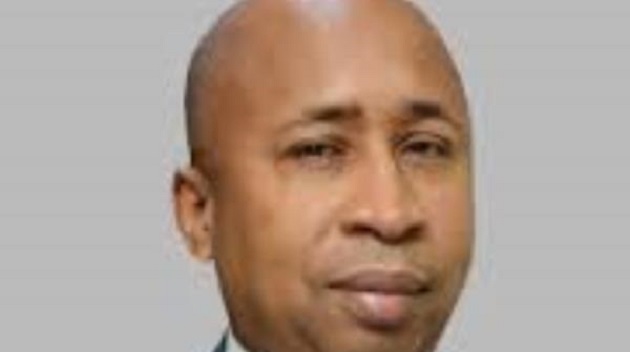General News
NNPC Keeps N100Bn Fuel as Strategic Reserve.

Petroleum products worth about N100 billion are currently kept as strategic reserve for the nation by the Nigerian National Petroleum Corporation (NNPC).
Dr Omar Farouk Ibrahim, spokesman NNPC,said yesterday that the corporation has the mandate to keep at least 32 days of fuel reserve in case of any unforeseen circumstance.
Reacting to the $10.8 billion unremitted funds by the corporation to the federation account, Ibrahim said the 32-day reserve when multiplied by 35 million litres daily consumption of the country, at the rate N97 per litre, valued atN108 billion, is what the corporation is keeping for the nation but is not being captured as part of what the corporation is saving for the nation.
He said the law stated that not all of these products should be kept on the land some part of it should be on the high sea. “So we have to keep these ships on top of the sea, as well as pay demurrage on them. All these are part of our operational cost”.
According to him, a lot have been happening in the country which drains the corporation’s account but remained unnoticed by the CBN and other record holders.
He admitted that it was not possible to say that the corporation is clean completely, but it is certainly not as bad as many people are taking it to be.
“NNPC has not been receiving subsidy reimbursement for the last two years and the government has not captured that in the unremitted revenue”, he said.
“In 2012 almost singlehandedly NNPC imported fuel into the country without any intervention from the marketers but not a penny is given to NNPC as subsidy”
He said the same people that are accusing the NNPC are aware that the corporation has not been receiving its subsidy and they didn’t say anything about that.
“On the $10.8 billion that is said to be missing, our position is this, since January 2012 we have been importing fuel, but up to today, we have not been paid subsidy”.
He said billions of Naira are going down the drain from the corporation account due to the incessant vandalism of the pipelines and are repaired by the NNPC.
He said: “ Since the subsidy crisis, we kept the country wet with fuel. Secondly, pipeline vandalism is another issue. Technically it is a responsibility of government to provide enabling environment for businesses to strive,..unfortunately our 6,000 kilometres of pipelines are always hacked. We are losing so much from theft, from repair and from the idle time, all these are not taken into consideration”.
General News
CSCS Reports Strong 2024 Results as PBT Rises by 24%

Central Securities Clearing System (CSCS) Plc has released its audited consolidated and separate financial statements for the year ended December 31, 2024, delivering a robust performance marked by double-digit growth in revenue and profitability.

Total revenue surged by 37 percent to N26.1 billion in 2024, up from N19 billion the previous year. Profit before tax also rose significantly, climbing 24 percent to N13.8 billion, compared to N11.2 billion in 2023.
The impressive results were largely driven by a 62 percent year-on-year increase in fee-based income, which rose to N11.9 billion from N7.3 billion, fuelled by heightened capital market activity. Ancillary services also contributed strongly, growing 27 percent from N8.1 billion in 2023 to N10.3 billion, buoyed by optimised service delivery and increased customer engagement.
CSCS maintained a strong balance sheet, with total assets rising 22 percent to N64.4 billion from N52.8 billion in the previous year. Key financial ratios also improved, with return on average equity at 30 percent, return on average assets at 20 percent, and earnings per share increasing to 239 kobo from 202 kobo in 2023.
Temi Popoola, chairman of the Board of CSCS, praised the performance amid a challenging economic climate.
“Despite the macroeconomic headwinds of 2024, we delivered strong results across key financial and operational indicators. Our strategy of consolidating our core offerings while expanding into new business areas enabled us to grow gross earnings by 37 percent, reaching N26.1 billion”.
Popoola added, “In light of this strong performance and our commitment to delivering long-term value to shareholders, the Board has proposed a dividend of N1.76 per share, amounting to a total payout of N8.8 billion.”
Haruna Jalo-Waziri, Managing Director and Chief Executive Officer of CSCS, emphasised the resilience and adaptability of CSCS’s business model. “Our 2024 performance highlights the sustainability of our revenue streams across both traditional and emerging segments.
“We continue to diversify into new areas and leverage technology to enhance scale and capacity in line with our strategic objectives. Amidst economic challenges, we grew operating income by 44 percent to N22.2 billion, while maintaining a cost-to-income ratio of 47 percent, reflecting our focus on operational efficiency.”
General News
NITDA, SecDojo Forge Partnership to Strengthen Nigeria’s Cybersecurity Resilience

National Information Technology Development Agency (NITDA) has signed a Memorandum of Understanding (MoU) with SecDojo, SAS, a France-based cybersecurity training company, during the GITEX Africa 2025 event in Marrakech, Morocco.

L-R: Director General of NITDA, Kashifu Inuwa CCIE, and Chief Executive Officer of SecDojo, Mr. Younes Benzagmout at the signing ceremony, which took place during GITEX Africa 2025 in Marrakech, Morocco.
This collaboration aims to bolster Nigeria’s cybersecurity framework through targeted capacity-building initiatives.
The partnership will focus on establishing a Cybersecurity Academy, delivering advanced training programs, developing customized curricula, and fostering research and professional exchange.
NITDA’s Director General, Kashifu Inuwa, emphasized the importance of investing in human capital to drive Nigeria’s digital transformation and address the global shortage of cybersecurity professionals.
He highlighted Nigeria’s youthful population as a key asset in filling this talent gap.
Inuwa also advocated for integrating digital literacy and cybersecurity training into Nigeria’s formal education system, calling for collaboration between technology stakeholders and the Federal Ministry of Education.
He stressed the need for systemic integration of digital skills into academic curricula to prepare for the future.
SecDojo’s CEO, Younes Benzagmout, expressed enthusiasm for the partnership and reaffirmed the company’s commitment to supporting Nigeria’s cybersecurity professionals.
This collaboration marks a significant step toward securing Nigeria’s digital economy and enhancing its global competitiveness.
General News
MIT MBA Students Explore Digital Innovation at MTN Nigeria
Recently, MBA Students of the Sloan Business School, Massachusetts Institute of Technology (MIT) visited MTN Nigeria’s office in Ikoyi, Lagos, for an interactive session on digital innovation and transformation.
The visit, a part of an academic exploration, provided the students with an opportunity to engage with executives within the ecosystem of the leading tech company, such as its Chief Digital Officer, A’isha Mumuni, and Chief Corporate Services and Sustainability Officer, Tobe Okigbo. who shared insights into the evolving digital landscape in Africa and beyond.
During her presentation, Mumuni emphasised: “The digital economy in Nigeria is evolving rapidly, but we must also acknowledge the hurdles, such as financial inclusion, language barriers in digital assistants, and internet penetration that we need to overcome to ensure that no one is left behind.”
One of the key topics discussed was financial inclusion, a critical issue in Nigeria where a significant portion of the population remains unbanked.
“We are still a largely cash-based economy. About 55% of Nigerians do not have access to financial services. The informal sector thrives on cash transactions, but as we’ve seen globally, access to different financial tools is key to economic growth,” Mumuni explained.
The students also engaged in discussions on the role of artificial intelligence (AI) in bridging the digital divide. A major concern raised was the limitation of AI-powered virtual assistants in understanding and responding to indigenous African languages.
Mumuni encouraged the postgraduates to think critically about Africa’s digital future and to consider how technological innovation could drive social and economic progress on the continent.
The visit provided MIT students with first-hand exposure to Africa’s digital transformation and potential areas of collaboration in bridging the digital divide.
This was the second courtesy visit to MTN’s headquarters from an educational institution in the past week. On March 12, 2024, 65 postgraduate students of the Pan-Atlantic University (PAU), visited three of the company’s locations in Ikoyi.
Recently, MBA Students of the Sloan Business School, Massachusetts Institute of Technology (MIT) visited MTN Nigeria’s office in Ikoyi, Lagos, for an interactive session on digital innovation and transformation.
The visit, a part of an academic exploration, provided the students with an opportunity to engage with executives within the ecosystem of the leading tech company, such as its Chief Digital Officer, A’isha Mumuni, and Chief Corporate Services and Sustainability Officer, Tobe Okigbo. who shared insights into the evolving digital landscape in Africa and beyond.
During her presentation, Mumuni emphasised: “The digital economy in Nigeria is evolving rapidly, but we must also acknowledge the hurdles, such as financial inclusion, language barriers in digital assistants, and internet penetration that we need to overcome to ensure that no one is left behind.”
One of the key topics discussed was financial inclusion, a critical issue in Nigeria where a significant portion of the population remains unbanked.
“We are still a largely cash-based economy. About 55% of Nigerians do not have access to financial services. The informal sector thrives on cash transactions, but as we’ve seen globally, access to different financial tools is key to economic growth,” Mumuni explained.
The students also engaged in discussions on the role of artificial intelligence (AI) in bridging the digital divide. A major concern raised was the limitation of AI-powered virtual assistants in understanding and responding to indigenous African languages.
Mumuni encouraged the postgraduates to think critically about Africa’s digital future and to consider how technological innovation could drive social and economic progress on the continent.
The visit provided MIT students with first-hand exposure to Africa’s digital transformation and potential areas of collaboration in bridging the digital divide.
This was the second courtesy visit to MTN’s headquarters from an educational institution in the past week. On March 12, 2024, 65 postgraduate students of the Pan-Atlantic University (PAU), visited three of the company’s locations in Ikoyi.

 E-Business2 days ago
E-Business2 days agoNITDA Warns Against Fake Google Play Store

 General News2 days ago
General News2 days agoLagos Commences Integration of NIN with State Single Social Register

 News2 days ago
News2 days agoNOA Uncovers Fraud by Banks, Universities in Students Loan Scheme

 E-Financial2 days ago
E-Financial2 days agoUBA Redefines Banking with Next-Gen PoS Terminals and Revamped MONI App

 E-Financial2 days ago
E-Financial2 days agoSEC Bans Unregistered Digital Asset Exchanges, Online Forex Platforms

 E-Financial2 days ago
E-Financial2 days agoAfrica Loses $88.6Bn Yearly to Corruption- ECOWAS

 E-Financial2 days ago
E-Financial2 days agoNIBSS Heads to Court to Recover N4Bn Lost due to System Glitch

 General News2 days ago
General News2 days agoNigeria Records $6.83Bn Balance of Payments Surplus in 2024 Amid Economic Reforms























